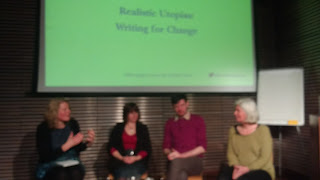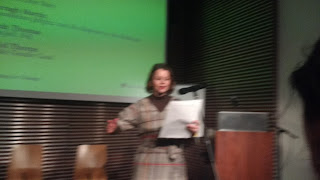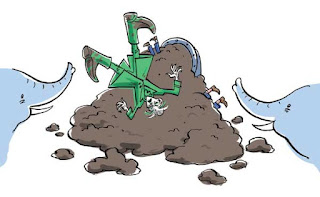Whether you call is climate fiction, cli-fi, stories for change or have your own pet name, it really doesn't matter. It is now such a broad church that this collection includes poetry, a very funny children's story (with illustrations), speculative fiction, human interest and domestic drama.
The book is a free download:
There was a previous collection last year:
It grew out of an event that brought together fifty scientists and thinkers and fifty writers in a series of workshops. (Listen to it here.)
"One thing we have seen very clearly is that over the 12 years of TippingPoint’s life, writers' responses to the subject have grown far more sophisticated and increased in their range and scope," observed the director of the Free Word Centre, Peter Gingold, as he introduced the writers to this sold out event.
 |
| The audience arrives for the launch event. |
 |
| Peter Gingold introduces the authors. |
 |
| Sarah Thomas read from her story based on her friendship with the widow of the one man who died in the Cumbrian floods of the winter of 2014-15, Rainfell, Fell. |
 |
| Emma Howell read from Thrift: A Love Story about her father's attempts to go green in the 1970s. |
Then I read from my story For the Greater Good, set in 2084, in which I imagine the possible side-effects of Britain achieving a goal of feeding its population and satisfying all of its energy from renewables.
But as I'm taking the photos there isn't one of me! Anyway, a number of people said afterwards how affecting the story is. Which was satisfying, so thank you.
 |
| Then Darragh Martin read from his hilarious kids' tale Thumbelina Jellyfizz and the Elephant in the Bathroom, with vibrant illustrations from Euan Cook: |
There was the inevitable panel discussion, with Durham University's Harriet Bulkley introducing Jane Riddiford, the visionary founder of the amazing Global Generation, a club for teenagers and kids in King's Cross, central London. She explained how she got the children interested in nature.
 |
| L2R: Harriet Bulkley, Emma Howell, Darragh Martin and Jane Riddiford, |
This led to the following amazing film about their work:
She guides them through periods of silent contemplation and then asks them to write about nature. Three of them came to read their work:
 |
Samika of Global Generation reading her poem on nature.
|
 |
Aisha of Global Generation
|
 |
Rania of Global Generation
|
 |
| That's me in the middle at the front! |
The stories in this collection are all domestic. They show lives, families, affected by the changing climate and our reactions to it. They help us think about what this means and come to terms with the enormity of it. They let us develop and consider our own emotional responses.
Find out more here: https://www.freewordcentre.com/explore/realistic-utopias-writing!
[David Thorpe is the writer of Marvel's Captain Britain, the sci-fi YA novels Hybrids, Doc Chaos: The Chernobyl Effect and the climate change fantasy Stormteller.]



No comments:
Post a Comment